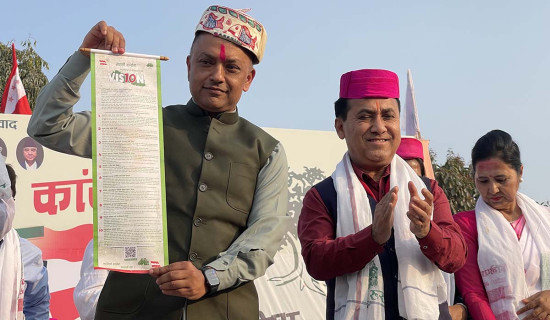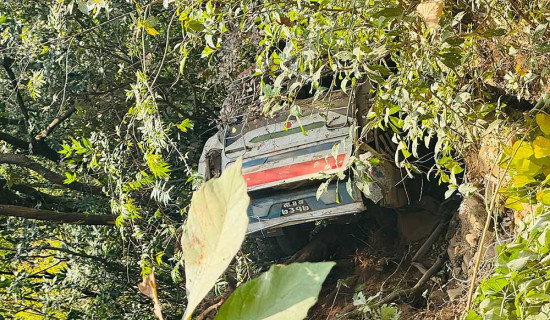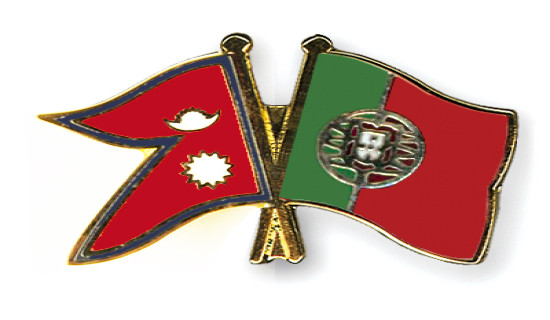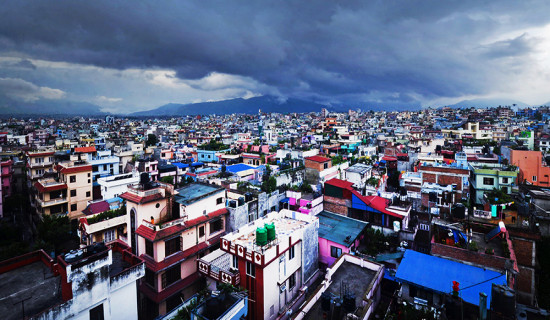- Thursday, 19 February 2026
Polarisation Shakes Democratic Coherence
Nepali politics is unfolding into a multi-polar course, not only in the style of governance but also in the relationship between the government and a chorus of screaming opposition and within political parties of a diverse range. This course has warped the cohesive and coordinated process of governance. It has also limped social discipline and political order defined by the mores of constitutionalism. This is the key blockage in spawning common grounds for several forces of Nepali society to cooperate and organise effective collective action on behalf of the public. So long as Nepali leaders are seized by deep factionalism, it is hard for them to undertake conscious, rational roles and wriggle out of the national situation of political stasis that puts them in an unfavourable light, unable to address a slew of failures.
The cause of this trend is the absence of reasoned public debate about the purity of politics, both at inter- and intra-party and intra-societal levels, for perfecting democratic maturity. Leaders’ self-obsessive habits of acquisition have hindered the growth of institutional culture in the nation. As a result, impersonal institutions are incapable of creating a fair system of equality, inclusion and proportionality imagined by the Nepali constitution. It portends the persistence, not a divorce, between the democratic sphere of equality and the social and economic sphere of inequality. Creation of an equal playing field is vital to harmonize the polarised politics into a national course.
New alignment of opposition
The partnership of opposing political parties in the government and the new alignment of opposition against it symbolise an instrumental struggle for survival, not a strategic one to realise the rights of Nepalis and depolarise national politics haunted by paranoia of conspiracy-mongering. Nepali culture, civilisation and reflection on spirituality can be deemed important for political socialisation and acculturation because they can transcend the power of grasping the insensitivity of leadership and the collective selfishness of political parties, rooted in the unbending character of human nature, rooted in herd instinct.
The service of national interest and public goods, the locus of politics, requires Nepali leadership to get through this insular-minded political culture and broaden perspectives in the spirit of democracy. Absolute political pragmatism, devoid of democratic ideals, condemns morality and justice, the weapons of the weak.
The dispersion of civic education through civic institutions, media and schools of political parties would be able to bridge the polarised politics of Nepal and orient it to a shared national vision. This enables Nepali leaders and people to learn to live together as co-citizens without multiplying their malaises and tame the uncultured signs of corrupt human nature. Nepalis can satisfy their basic needs if the government can fulfill their rights beyond its own craving and address the nation's structural and policy challenges. The awakened conscience of people refuses to be satisfied with the unfair condition. Civic culture snubs to lower its dignity to others but resolves the dilemma between conscience and public duty.
The rational spirit of the Nepali constitution demands the concern of the dejected. This makes them equal stakeholders of democracy and bridges the polarised identity of haves and have-nots or even several contesting mini-identities operating in centrifugal tips. When the value of citizenship is subordinated to the underside of subsidiary identity or organised politics, it stokes a threat to culture, democracy and human rights of ordinary Nepalis. Nepal’s political culture of conformity to top leadership rather than parties, its committees, statutes and ideologies does not brew the collective national awareness required of active citizenship informed by civic gift.
Ideological alchemy of all Nepali parties into a catch-all type for power-sharing marks the erosion of the real functions of political parties. Nepali media cynically interpret the functions of public institutions and constitutional bodies as per their mandate, able to offer a lawful tonic to satisfy the public. A multi-party polity does not mean it has to be multi-forked in character. In a well-institutionalised polity, certain constitutional values and rules of conduct govern them and political parties contest over policies, ideologies and programmes but agree on matters of public good and national interests and abide by the electoral mandate.
It is an ironic twist of fate for Nepali leaders that they are troubled by and alienated from their own ideologies and lofty promises. The national identity of Nepal can be built on the basis of national consciousness, not excessively partisan or polarised obsession with zero-sum mentality and inexplicable ineptitude. The latter process can only obstruct Nepalis of diverse cultures getting along without howling against each other’s pitfalls. Political parties of all hues of the nation, no matter whether they have an adequate mandate or not, seek to ride in power unmindful of their effects on generating contradictions and cross-party animosities. For them, power is an arena of advantage, impunity, resources and recognition, not a public duty to the well-being of people.
This shows that respect for opposition is less salient. One reason for power lust is the growing monetisation of Nepali politics, not a public sphere of volunteerism and policy making, which was abandoned by the Nepali parliament long ago. Politics becomes vacuous if it is divorced from public opinion, public policy and accountability. The increasing electoral costs of politics in Nepal have led to the corporate houses that peddle influence on policy making in their favour, thus leaving the electoral promises and constitutional goals mostly unattended. It is ironic to see that Nepali leaders and political parties lure the voters with attractive and conflicting slogans rather than inducing them to find a good social and national cause and mobilizing them for mutual progress.
So long as the party of elites is not transformed into a party of people, the excruciating frustration of people would persist to torment them and a search for common purposes of stability and progress would vanish in the shadow. Sanctification of corruption, rent-seeking and crime hobbles economic rationality of production and fails to flag the welfare provisions of the constitution to the right course. Dreary economic basics except in hydro, IT and remittance, have helped little to initiate structural economic reforms to support livelihoods and social cohesion. The share of Nepali workers in the national economy is the highest, more than the share of capital, tax, tourism, foreign aid and investment. Their share in the national economy through remittance does not mean it is offering them freedom, individual choice and wellbeing.
The social, economic and political costs of migration of capital, labour and brain are painful. The loss of the upbeat spirit of youth and innovators has lingered in the political and constitutional status quo. The motif of clinging to power in Nepal is sustained by stitching coalition allies, not building a cohesive nation. Social mobility, self-chosen ties and evacuation of youths have weakened social and intergenerational solidarity. It has infected the dynamics of the Nepali economy and politics, lacking a critical mass of change agents.
One critical challenge is how to make party politics an integral part of the everyday life of people, which can empower them and help to acquire dignity. The six input functions of party — political education, mobilization, interest aggregation and articulation, communication and mediation of public policy -- are central to making them functional. The other challenge is that Nepali mainstream leaders are more obsessed with tackling the backlogs of past problems rather than building the nation’s future, a future away from the domination of dominant interest groups, which wield influence behind the scenes and skews government performance.
The alternative sources of power- business, civil society, NGOs, property dealers and geopolitical interests influence public policy and gear political courses but they are less transparent and far less accountable for their actions. Still, the other challenge lies in restoring the checks and balances of the polity and strengthening the institutional safeguards to protect the rights of Nepalis, check the erosion of democracy and balance the distributional struggle of the poor and persistence of the status quo.
What counts in Nepali politics, like sports, is winning the game through the use of wild passion and emotion to support one’s own political party rather than applying reason to choose the best one capable of delivering services and repairing this old nation. Only the use of education, reason, culture and morality can provide a fresh reason for grounded hope because it is a suitable strategy to remove the historical prejudices, social conservatism and keep pace with technological change. Sincere morality in Nepali politics can prevent the authorities from eschewing the unfair distribution of power, resources and rights in society.
Common ground
Culture, knowledge, spiritualism and faith in deep ecology equally help to discover common ground for the resolution of social and political conflicts and attain a culture of peace beyond the ferocity of factionalism. The ability of social classes to transcend their egotism forms a basis of social and national integration. Civic patriotism liberates Nepalis from feudalism, class, caste and gender hierarchy and equalizes their political identity of sovereignty. But the ideals, practices and institutions of democracy must be able to decouple themselves from coercive economic, political and geopolitical leverage.
Civil society, courts, human rights bodies and community organisations have to play critical roles in the mediation of competing extremes and educate the public to find satisfaction in the middle path. Most troubles of contemporary Nepal arise from the deflation of politics, unwarranted interference in the private life of citizens and a violation of political decency by powerful leaders, which are occasionally corrected by court verdicts. Democratic politics wheels the grounds of justice in the institutions and skirts the privileges of legal over the political process, binds polarised politics and restores the Nepali wisdom of dharma by releasing its propulsive energy to steer the society and the state to rational direction.
(Former Reader at the Department of Political Science, TU, Dahal writes on political and social issues.)

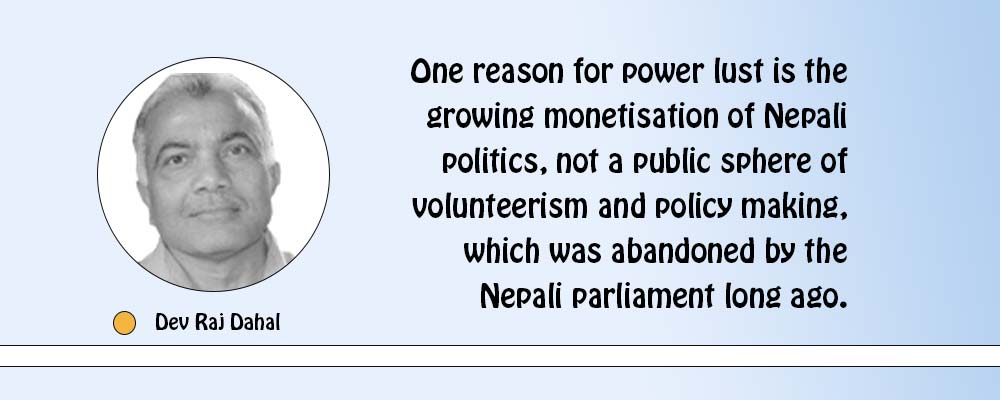







-original-thumb.jpg)
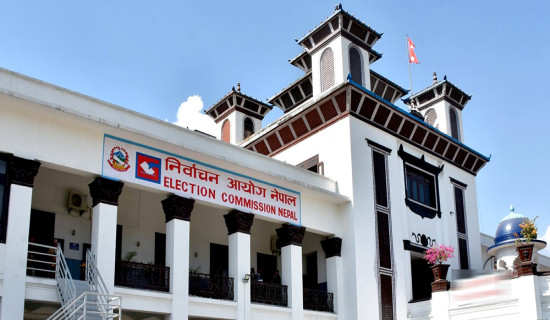
-original-thumb.jpg)

